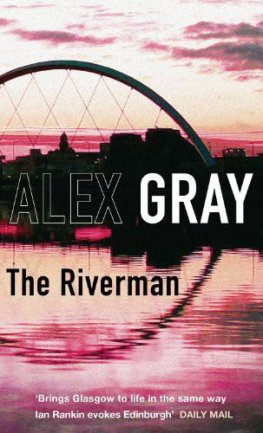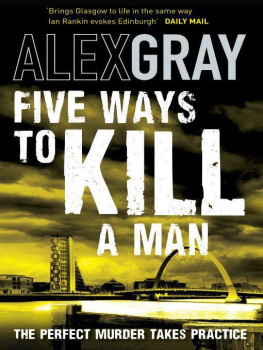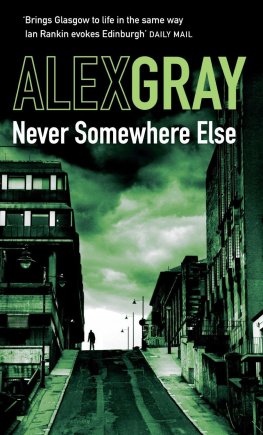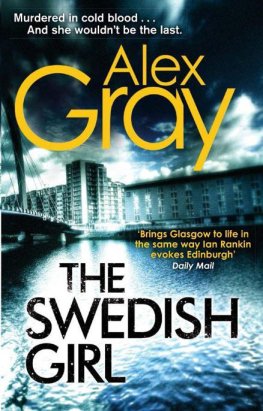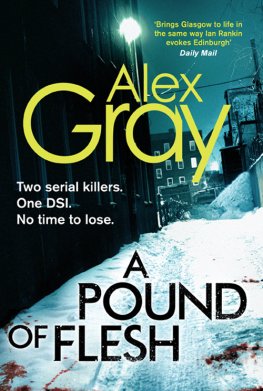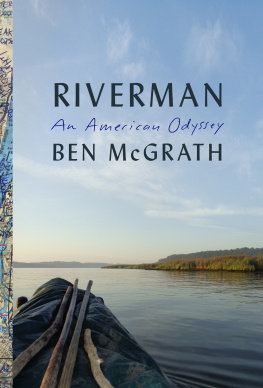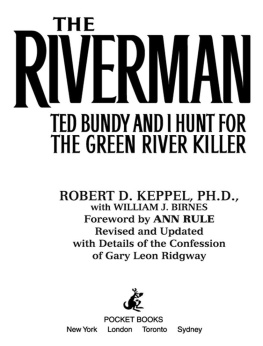Alex Gray - The Riverman
Here you can read online Alex Gray - The Riverman full text of the book (entire story) in english for free. Download pdf and epub, get meaning, cover and reviews about this ebook. year: 0101, genre: Detective and thriller. Description of the work, (preface) as well as reviews are available. Best literature library LitArk.com created for fans of good reading and offers a wide selection of genres:
Romance novel
Science fiction
Adventure
Detective
Science
History
Home and family
Prose
Art
Politics
Computer
Non-fiction
Religion
Business
Children
Humor
Choose a favorite category and find really read worthwhile books. Enjoy immersion in the world of imagination, feel the emotions of the characters or learn something new for yourself, make an fascinating discovery.
- Book:The Riverman
- Author:
- Genre:
- Year:0101
- Rating:5 / 5
- Favourites:Add to favourites
- Your mark:
- 100
- 1
- 2
- 3
- 4
- 5
The Riverman: summary, description and annotation
We offer to read an annotation, description, summary or preface (depends on what the author of the book "The Riverman" wrote himself). If you haven't found the necessary information about the book — write in the comments, we will try to find it.
The Riverman — read online for free the complete book (whole text) full work
Below is the text of the book, divided by pages. System saving the place of the last page read, allows you to conveniently read the book "The Riverman" online for free, without having to search again every time where you left off. Put a bookmark, and you can go to the page where you finished reading at any time.
Font size:
Interval:
Bookmark:
Alex Gray
The Riverman
PROLOGUE
THE RIVERMAN
The riverman knew all about the Clyde. Its tides and currents were part of his heritage. His father and others before him had launched countless small craft from the banks of the river in response to a cry for help. Nowadays that cry came in the form of a klaxon that could waken him from sleep, the mobile phone ringing with information about where and when. It wouldnt be the first time that hed pulled someone from the icy waters with only a hasty oilskin over his pyjamas.
This morning, at least, hed been up and doing when the call came. The body was over by Finnieston, past the weir, so hed had to drive over the river towing a boat behind him on the trailer. He was always ready. That was what this job was all about: prompt and speedy response in the hope that some poor sods life could be saved. And hed saved hundreds over the years, desperate people who were trying to make up their mind to jump off one of the many bridges that spanned the Clyde or those who had made that leap and been saved before the waters filled their lungs.
George Parsonage had been brought up to respect his river. Once it had been the artery of a great beating heart, traffic thronging its banks, masts thick as brushwood. The tobacco trade with Virginia had made Glasgow flourish all right, with the preaching of commerce and the praising of a New World that was ripe for plucking. The names of some city streets still recalled those far-off days. Even in his own memory, the Clyde had been a byword for ships. As a wee boy, George had been taken to the launch of some of the finer products of Glasgows shipbuilding industry. But even then the rivers grandeur was fading. Hed listened to stories about the grey hulks that grew like monsters from the deep, sliding along the water, destined for battle, and about the cruise liners sporting red funnels that were cheered off their slipways, folk bursting with pride to be part of this city with its great river.
The romance and nostalgia had persisted for decades after the demise of shipbuilding and cross-river ferries. Books written about the Clydes heyday still found readers hankering after a time that was long past. The Glasgow Garden Festival in the eighties had prompted some to stage a revival along the river and more recently there had been a flurry of activity as the cranes returned to erect luxury flats and offices on either side of its banks. Still, there was little regular traffic upon its sluggish dark waters: a few oarsmen, a private passenger cruiser and the occasional police launch. Few saw what the river was churning up on a daily basis.
As he pushed the oars against the brown water, the riverman sent up a silent prayer for guidance. Hed seen many victims of despair and violence, and constantly reminded himself that each one was a person like himself with hopes, dreams and duties in different measure. If he could help, he would. That was what the Glasgow Humane Society existed for, after all. The sound of morning traffic roared above him as he made his way downstream. The speed of response was tempered by a need to row slowly and carefully once the body was near. Even the smallest of eddies could tip the body, filling the air pocket with water and sending it down and down to the bottom of the river. So, as George Parsonage approached the spot where the body floated, his oars dipped as lightly as seabirds wings, his eyes fixed on the shape that seemed no more than a dirty smudge against the embankment.
The riverman could hear voices above but his eyes never left the half-submerged body as the boat crept nearer and nearer. At last he let the boat drift, oars resting on the rowlocks as he finally drew alongside the rivers latest victim. George stood up slowly and bent over, letting the gunwales of the boat dip towards the water. Resting one foot on the edge, he hauled the body by its shoulders and in one clean movement brought it in. Huge ripples eddied away from the side as the boat rocked upright, its cargo safely aboard.
The victim was a middle-aged man. Hed clearly been in the water for some hours so there was no question of trying to revive him. The riverman turned the head this way and that, but there was no sign of a bullet hole or any wound that might indicate a sudden, violent death. George touched the sodden coat lightly. Its original camel colour was smeared and streaked with the rivers detritus, the velvet collar an oily black. Whoever he had been, his clothes showed signs of wealth. The pale face shone wet against the pearly pink light of morning. For an instant George had the impression that the man would sit up and grasp his hand, expressing his thanks for taking him out of the water, as so many had done before him. But today no words would be spoken. There would be only a silent communion between the two men, one dead and one living, before other hands came to examine the corpse.
George grasped the oars and pulled away from the embankment. Only then did he glance upwards, nodding briefly as he identified the men whose voices had sounded across the water. DCI Lorimer caught his eye and nodded back. Up above the banking a couple of uniformed officers stood looking down. Even as he began rowing away from the shore, the riverman noticed a smaller figure join the others. Dr Rosie Fergusson had arrived.
Meet you at the Finnieston steps, George, Lorimer called out.
The riverman nodded briefly, pulling hard on the oars, taking his charge on its final journey down the Clyde.
PART ONE
CHAPTER 1
Duncan Forbes knew what he had to do.
He pulled the camel coat onto its hanger as he did every winter morning, felt the brown velvet collar under his fingers, then hung it over the old wooden coat stand. Like so much in this room the coat stand seemed to have been there for ever, its worn varnish a dull yellow against the dark wood-panelled walls. The faint scent of furniture polish lingered from the earlier ministrations of the cleaning staff, a whiff of lemon sharpening the air.
Duncan allowed a small sigh to emanate from his chest. He frowned. As one of the older partners of Forbes Macgregor, Duncan was not known for indulging in sentimentality, yet, as he stood quietly facing the corner of the room, he felt as though all his senses were heightened. For the first time he wondered how many more days he would be able to come here and hang up his coat in its customary place. Somehow that small action mattered more than all the consequences to come. Hed already faced the idea of losing one half of the house and the cottage in Argyllshire. Night after night hed forced himself to picture the aftermath of the firms collapse, sweat beading his forehead as he lay on his back, images of the future dancing mad patterns on the ceiling. Hed come to terms with all of that, though what Liz would make of it God alone knew.
It was always something that happened to other people, other firms, those modern ones that sprang up like weeds only to be pulled out and chucked on the compost heap of progress, not an old, respected establishment like Forbes Macgregor. And this cover-up must have been going on for years, maybe even before the firm had become one of the Big Six
Duncan looked around the room that had been his fathers office and his fathers before him. A family firm of accountants, established nearly a century ago, was a matter of some pride, especially when it was now a player on the international stage. Hed never resisted the gentle push towards continuing in the family tradition. On the contrary, hed welcomed the chance to step into a job with such a secure future. His mouth twisted at the thought. Security. Nothing would be secure once hed set things in motion. His eyes fell upon the frame that held his practising certificate. When hed first hooked it on to its place on the wall, Duncan had looked upon it as an achievement; the guarantee of a substantial career. Now he saw it as only a piece of paper caught behind a fragile sheet of glass.
Font size:
Interval:
Bookmark:
Similar books «The Riverman»
Look at similar books to The Riverman. We have selected literature similar in name and meaning in the hope of providing readers with more options to find new, interesting, not yet read works.
Discussion, reviews of the book The Riverman and just readers' own opinions. Leave your comments, write what you think about the work, its meaning or the main characters. Specify what exactly you liked and what you didn't like, and why you think so.

